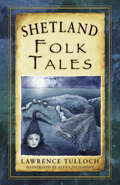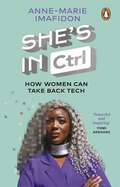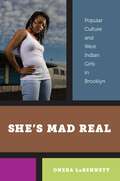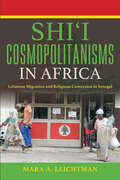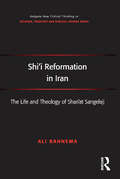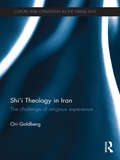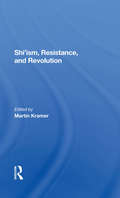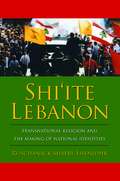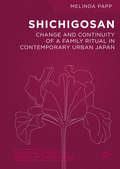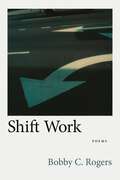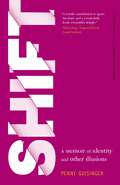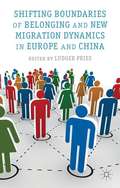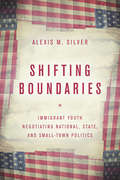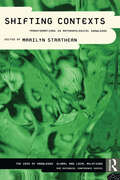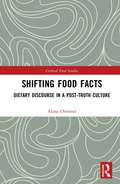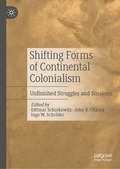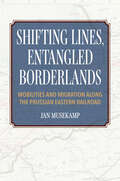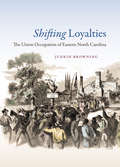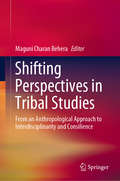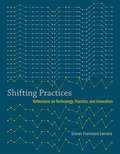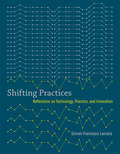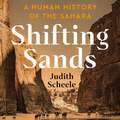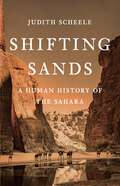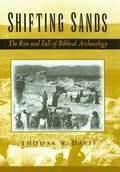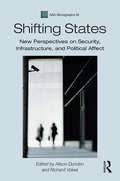- Table View
- List View
Shetland Folk Tales (Folk Tales: United Kingdom)
by Lawrence TullochThe folklore of the North East provides a rich tapestry for the tales within; from Celtic and Pictish origins meet witches, selkies, smugglers, fairies, monsters, despicable rogues, riddles and heroes. Tragic events, spellbinding characters, humour, romance and clever minds are bound together by two well-established storytellers living and working in the city and shire of Aberdeen. Some of the tales in this collection are based on historical fact while others are embedded in myth and legend. All the stories are set against the backdrop of this lovely and varied landscape. Sheena and Grace have both been inspired in their storytelling and singing by the traveller, raconteur and balladeer, Stanley Robertson.
She’s In CTRL: How women can take back tech – to communicate, investigate, problem-solve, broker deals and protect themselves in a digital world
by Anne-Marie Imafidon'A practical and positive guide to using tech to change women's lives for the better' -Caroline Criado Perez, author of Invisible Women: exposing data bias in a world designed for men'A powerful and inspiring call to action from one of Britain's brightest minds'- Yomi Adegoke, award-winning journalist, author of Slay in Your Lane etc.Why are women so under-represented in the tech world?Why does this matter?What can we do about it? A book that asks essential questions and provides long-overdue practical solutions. Perfect for readers of Invisible Women.Why do so many of us - particularly women - feel the tech world is beyond reach? Women are woefully under-represented in tech - they represent roughly a mere quarter of the UK STEM workforce. This means an ever-increasing series of big decisions are made by a small number of people, mainly men.So what are the challenges for all of us who want to wrest back control? How do we get past the gatekeepers? When we do, what are the opportunities that will open up - for us in our individual roles, and for the future of tech?.Dr Imafidon shows we have more agency than we think, drawing on her own experience and the stories of other pioneers and innovators to provide examples, exercises and practical guidance for how to get started and take control.There will always be problems. But, as we know, women are problem-solvers.
She’s Mad Real: Popular Culture and West Indian Girls in Brooklyn
by Oneka LaBennettOverwhelmingly, Black teenage girls are negatively represented in national and global popular discourses, either as being “at risk” for teenage pregnancy, obesity, or sexually transmitted diseases, or as helpless victims of inner city poverty and violence. Such popular representations are pervasive and often portray Black adolescents’ consumer and leisure culture as corruptive, uncivilized, and pathological.In She’s Mad Real, Oneka LaBennett draws on over a decade of researching teenage West Indian girls in the Flatbush and Crown Heights sections of Brooklyn to argue that Black youth are in fact strategic consumers of popular culture and through this consumption they assert far more agency in defining race, ethnicity, and gender than academic and popular discourses tend to acknowledge. Importantly, LaBennett also studies West Indian girls’ consumer and leisure culture within public spaces in order to analyze how teens like China are marginalized and policed as they attempt to carve out places for themselves within New York’s contested terrains.
Shi'i Cosmopolitanisms in Africa: Lebanese Migration And Religious Conversion In Senegal (Public Cultures Of The Middle East And North Africa Ser.)
by Mara A. LeichtmanMara A. Leichtman offers an in-depth study of Shi'i Islam in two very different communities in Senegal: the well-established Lebanese diaspora and Senegalese "converts" from Sunni to Shi'i Islam of recent decades. Sharing a minority religious status in a predominantly Sunni Muslim country, each group is cosmopolitan in its own way. Leichtman provides new insights into the everyday lives of Shi'i Muslims in Africa and the dynamics of local and global Islam. She explores the influence of Hizbullah and Islamic reformist movements, and offers a corrective to prevailing views of Sunni-Shi'i hostility, demonstrating that religious coexistence is possible in a context such as Senegal.
Shi'i Reformation in Iran: The Life and Theology of Shari’at Sangelaji (Routledge New Critical Thinking in Religion, Theology and Biblical Studies)
by Ali RahnemaShi 'ism caught the attention of the world as Iran experienced her revolution in 1979 and was subsequently cast in the mold of a monolithic discourse of radical political Islam. The spokespersons of Shi'i Islam, in or out of power, have not been the sole representatives of the faith. Nonconformist and uncompromising, the Shi’i jurist and reformist Shari’at Sangelaji (1891-1944) challenged certain popular Shi’i beliefs and the mainstream clerical establishment, guarding and propagating it. In Shi'i Reformation in Iran, Ali Rahnema offers a fresh understanding of Sangelaji’s reformist discourse from a theological standpoint, and takes readers into the heart of the key religious debates in Iran in the 1940s. Exploring Sangelaji’s life, theological position and disputations, Rahnema demonstrates that far from being change resistant, debates around why and how to reform the faith have long been at the heart of Shi’i Islam. Drawing on the writings and sermons of Sangelaji, as well as interviews with his son, the book provides a detailed and comprehensive introduction to the reformist’s ideas. As such it offers scholars of religion and Middle Eastern politics alike a penetrating insight into the impact that these ideas have had on Shi’ism - an impact which is still felt today.
Shi'i Theology in Iran: The Challenge of Religious Experience (Culture and Civilization in the Middle East)
by Ori GoldbergTaking a theologically oriented method for engaging with historical and cultural phenomena, this book explores the challenge, offered by revolutionary Shi’i theology in Iran, to Western conventions on theology, revolution and religion’s role in the creation of identity. Offering a stringent critique of current literature on political Islam and on Iran's 1979 Islamic Revolution, the author suggests that current literature fails to perceive and engage with the revolution and its thought as religious phenomena. Grounded in the experience of unconditional faith in God, Shi'i thinkers recognize a distinction between the human and the divine. Concerned with the challenge of constructing a virtuous society, these thinkers pose a model of authority and morality based on mediation, interpretation and participation in the experience of faith. Ori Goldberg considers this interpretative model utilizing a broad array of theoretical tools, most notably critical theologies drawn from Jewish and Christian thought. He draws on a close reading of several texts written by prominent Iranian Shi'i thinkers between 1940 and 2000, most of which are translated into English for the first time, to reveal a vibrant, complex discourse. Presenting a new interfaith perspective on a subject usually considered beyond the scope of such research, this book will be an important reference for scholars of Iranian studies, political Islam, theology and cultural studies.
Shi'ism, Resistance, And Revolution
by Martin Kramer Clinton Bailey Shaul Bakhash Michael M J FischerThe recent revival of interest in the Muslim world has generated numerous studies of modern Islam, most of them focusing on the Sunni majority. Shi'ism, an often stigmatized minority branch of Islam, has been discussed mainly in connection with Iran. Yet Shi'i movements have been extraordinarily effective in creating political strategies that have
Shi'ite Lebanon: Transnational Religion and the Making of National Identities (History and Society of the Modern Middle East)
by Roschanack Shaery-EisenlohrBy recasting the relationship between religion and nationalism in the Middle East, Roschanack Shaery-Eisenlohr proposes a new framework for understanding Shi'ite politics in Lebanon. Her study draws on a variety of untapped sources, reconsidering not only the politics of the established leadership of Shi'ites but also institutional and popular activities of identity production. Shaery-Eisenlohr traces current Shi'ite politics of piety and authenticity to the coexistence formula in Lebanon and argues that engaging in the discourses of piety and coexistence is a precondition to cultural citizenship in Lebanon. As she demonstrates, debates over the nature of Christianity and Islam and Christian-Muslim dialogue are in fact intertwined with power struggles at the state level.Since the 1970s, debates in the transnational Shi'ite world have gradually linked Shi'ite piety with the support of the Palestinian cause. Iran's religious elite has backed this piety project in multiple ways, but in doing so it has assisted in the creation of a variety of Lebanese Shi'ite nationalisms with competing claims to religious and national authenticity. Shaery-Eisenlohr argues that these ties to Iran have in fact strengthened the position of Lebanese Shi'ites by providing, as is recognized, economic, military, and ideological support for Hizbullah, as well as by compelling Lebanese Shi'ites to foreground the Lebanese components of their identity more forcefully than ever before. Shaery-Eisenlohr challenges the belief that Shi'ite identity politics only serve to undermine the Lebanese national project. She also makes clear that the expression of Lebanese Shi'ite identity is a nationalist expression and an unintended result of Iranian efforts to influence the politics of Lebanon.
Shichigosan
by Melinda PappThis book presents a case study of shichigosan, an extremely popular childhood family ritual in contemporary Japan. It is an interesting example of a custom with very ancient roots (going back to the tenth century), that has undergone several transformations during the course of its history, adapting to changing socio-economic and cultural circumstances. Within the study, the ritual unfolds as a shared platform where basic social values, views on children and family life, and individual perceptions emerge, are expressed and moulded at the same time. This book offers a multidisciplinary approach to the study of a ritual practice in the intensely urbanized context of present-day Japan.
Shift Work: Poems (Southern Messenger Poets)
by Bobby C. RogersShift Work gathers a chorus from the storytelling working classes of the Upper South. In narrative poems made of sinewy, Whitmanesque lines, Bobby C. Rogers composes portraits of dwellers in the small towns, unincorporated communities, and hard-edged cities they have flown to, always packing their past with them, an inheritance as ephemeral as vapor, made mostly of memory even as it was being lived.
Shift: A Memoir of Identity and Other Illusions (American Lives)
by Penny GuisingerPenny Guisinger was not always attracted to women. In Shift she recounts formative relationships with women and men, including the marriage that produced her two children and ultimately ended in part due to her affair with her now-wife. Beginning her story as straight and ending as queer, she struggles to make sense of how her identity changed so profoundly while leaving her feeling like the same person she&’s always been. While covering pivotal periods of her life, including previous relationships and raising her children across the chasm of divorce, Guisinger reaches for quantum physics, music theory, planetary harmonics, palmistry, and more to interrogate her experiences. This personal story plays out against the backdrop of the national debate on same-sex marriage, in rural, easternmost Maine, where Guisinger watched her neighbors vote against the validity of her family.Shift examines sexual and romantic fluidity while wrestling with the ways past and present mingle rather than staying in linear narratives. Under scrutiny, Guisinger&’s sense of her own identity becomes like a Mobius strip or Penrose triangle—an optical illusion that challenges the dimensions and possibilities of the world.
Shifting Boundaries of Belonging and New Migration Dynamics in Europe and China
by Ludger PriesThis book explores the role that boundary making plays in creating a societal understanding of current migration dynamics and, by extension, in legitimising migration regimes. By comparing most recent developments in Europe and China, it reveals insights on convergent social and political practices of boundary making under divergent conditions.
Shifting Boundaries: Immigrant Youth Negotiating National, State, and Small-Town Politics
by Alexis M. SilverAs politicians debate how to address the estimated eleven million unauthorized immigrants residing in the United States, undocumented youth anxiously await the next policy shift that will determine their futures. From one day to the next, their dreams are as likely to crumble around them as to come within reach. In Shifting Boundaries, Alexis M. Silver sheds light on the currents of exclusion and incorporation that characterize their lives. Silver examines the experiences of immigrant youth growing up in a small town in North Carolina—a state that experienced unprecedented growth in its Latino population in the 1990s and 2000s, and where aggressive anti-immigration policies have been enforced. Drawing on ethnographic fieldwork and in-depth interview data, she finds that contradictory policies at the national, state, and local levels interact to create a complex environment through which the youth must navigate. From heritage-based school programs to state-wide bans on attending community college; from the failure of the DREAM Act to the rescinding of Deferred Action for Childhood Arrivals (DACA); each layer represents profound implications for undocumented Latino youth. Silver exposes the constantly changing pathways that shape their journeys into early adulthood—and the profound resilience that they develop along the way.
Shifting Contexts (ASA Decennial Conference Series: The Uses of Knowledge)
by Marilyn StrathernTo suppose anthropological analysis can shift between global and local perspectives may well imply that the two co-exist as broader and narrower horizons or contexts of knowledge. The proof for this can be found in ethnographic accounts where contrasts are repeatedly drawn between the encompassing realm and everyday life or in value systems which sumultaneously trivialise and aggrandise or in shifts between what pertains to the general or to the particular.
Shifting Food Facts: Dietary Discourse in a Post-Truth Culture (Critical Food Studies)
by Alissa OverendThis book offers a much-needed reframing of food discourse by presenting alternative ways of thinking about the changing politics of food, eating, and nutrition. It examines critical epistemological questions of how food knowledge comes to be shaped and why we see pendulum swings when it comes to the question of what to eat. As food facts peak and peril in the face of conflicting dietary advice and nutritional evidence, this book situates shifting food truths through a critical analysis of how healthy eating is framed and contested, particularly amid fluctuating truth claims of a “post-truth” culture. It explores what a post-truth epistemological framework can offer critical food and health studies, considers the type of questions this may enable, and looks at what can be gained by relinquishing rigid empirical pursuits of singular dietary truths. In focusing too intently on the separation between food fact and food fiction, the book argues that politically dangerous and epistemically narrow ideas of one way to eat “healthy” or “right” are perpetuated. Drawing on a range of archival materials related to food and health and interviews with registered dietitians, this book offers various examples of shifting food truths, from macro-historical genealogies to contemporary case studies of dairy, wheat, and meat. Providing a rich and innovative analysis, this book offers news ways to think about, and act upon, our increasingly complex food landscapes. It does so by loosening our empirical Western reliance on singular food facts in favour of an articulation of contextual food truths that situate the problems of health as problems of living, not as individualistic problems of eating. It will be of interest to students, scholars, and practitioners working in food studies, food politics, sociology, environmental geography, health, nutrition, and cultural studies.
Shifting Forms of Continental Colonialism: Unfinished Struggles and Tensions
by Dittmar Schorkowitz John R. Chávez Ingo W. SchröderThis book explores shifting forms of continental colonialism in Asia, Africa, Europe, and the Americas, from the early modern period to the present. It offers an interdisciplinary approach bringing together historians, anthropologists, and sociologists to contribute to a critical historical anthropology of colonialism. Though focused on the modern era, the volume illustrates that the colonial paradigm is a framework of theories and concepts that can be applied globally and deeply into the past. The chapters engage with a wide range of topics and disciplinary approaches from the theoretical to the empirical, deepening our understanding of under-researched areas of colonial studies and providing a cutting edge contribution to the study of continental and internal colonialism for all those interested in the global impact of colonialism on continents.
Shifting Lines, Entangled Borderlands: Mobilities and Migration along the Prussian Eastern Railroad
by Jan MusekampTracing multiple mobilities, entangled borderlands, microhistory and space, and human and nonhuman actors, Jan Musekamp demonstrates how an inner-Prussian railroad line turned into a transnational force, overcoming borders and connecting Europeans in a time of rising nationalism. Shifting Lines, Entangled Borderlands investigates the dichotomy between a globalizing world and tighter border control in nineteenth-century Central and Eastern Europe, focusing on the Royal Prussian Eastern Railroad (Ostbahn) between the 1830s and 1930s. The line was initially planned as a major internal modernizing project to connect Prussia's capital of Berlin to East Prussia's provincial capital of Königsberg (today's Kaliningrad). Soon, the Ostbahn connected to the growing Imperial Russian railroad network, thus becoming a backbone of European East–West transportation in trade, tourism, technological exchange, and migration. The First World War temporarily disrupted and reconfigured existing networks, adapting them to new political regimes and borders. However, World War II and its aftermath altered mobility patterns more permanently, dividing not only the Ostbahn tracks but the whole continent for decades to come. From border towns and major cities to unique structures, such as stations or bridges, this volume analyzes the obvious and not-so-obvious nodes of the Central and Eastern European rail network—and the spaces in between.
Shifting Loyalties
by Judkin BrowningIn the spring of 1862, Union forces marched into neighboring Carteret and Craven Counties in southeastern North Carolina, marking the beginning of an occupation that would continue for the rest of the war. Focusing on a wartime community with divided allegiances, Judkin Browning offers new insights into the effects of war on southerners and the nature of civil-military relations under long-term occupation, especially coastal residents' negotiations with their occupiers and each other as they forged new social, cultural, and political identities. Unlike citizens in the core areas of the Confederacy, many white residents in eastern North Carolina had a strong streak of prewar Unionism and appeared to welcome the Union soldiers when they first arrived. By 1865, however, many of these residents would alter their allegiance, developing a strong sense of southern nationalism. African Americans in the region, on the other hand, utilized the presence of Union soldiers to empower themselves, as they gained their freedom in the face of white hostility. Browning's study ultimately tells the story of Americans trying to define their roles, with varying degrees of success and failure, in a reconfigured country.
Shifting Perspectives in Tribal Studies: From an Anthropological Approach to Interdisciplinarity and Consilience
by Maguni Charan BeheraThis book brings together multidisciplinarity, desirability and possibility of consilience of borderline studies which are topically diverse and methodologically innovative. It includes contemporary tribal issues within anthropology and other disciplines. In addition, the chapters underline the analytical sophistication, theoretical soundness and empirical grounding in the area of emerging core perspectives in tribal studies. The volume alludes to the emergence of tribal studies as an independent academic discipline of its own rights. It offers the opportunity to consider the entire intellectual enterprise of understanding disciplinary and interdisciplinary dualism, to move beyond interdisciplinarity of the science-humanities divide and to conceptualise a core of theoretical perspectives in tribal studies. The book proves an indispensable reference point for those interested in studying tribes in general and who are engaged in the process of developing tribal studies as a discipline in particular.
Shifting Practices: Reflections on Technology, Practice, and Innovation
by Giovan Francesco LanzaraWhat happens in an established practice or work setting when a novel artifact or tool for doing work changes the familiar work routines? Any unexpected event, or change, or technological innovation creates a discontinuity; organizations and individuals must reframe taken-for-granted assumptions and practices and reposition themselves. To study innovation as a phenomenon, then, we must search for situations of discontinuity and rupture and explore them in depth. In Shifting Practices, Giovan Francesco Lanzara does just that, and discovers that disruptions and discontinuities caused by the introduction of new technologies often reveal aspects of practice not previously observed.After discussing methodological and research issues, Lanzara presents two in-depth studies focusing on processes of design and innovation in two different practice settings: music education and criminal justice. In the first, he works with the music department of a major American university to develop Music LOGO, a computer system that allows students to explore musical structures with simple, composition-like exercises and experiments. In the second, he works with the Italian court system in the design and use of video technology for criminal trials. In both cases, drawing on anecdotes and examples as well as theory and analysis, he traces the new systems from design through implementation and adoption. Finally, Lanzara considers the researcher's role, and the relationship -- encompassing empathy, vulnerability, and temporality -- between the reflective researcher and actors in the practice setting.
Shifting Practices: Reflections on Technology, Practice, and Innovation (Acting with Technology)
by Giovan Francesco LanzaraHow disruptions and discontinuities caused by the introduction of new technologies often reveal aspects of practice not previously observed.What happens in an established practice or work setting when a novel artifact or tool for doing work changes the familiar work routines? Any unexpected event, or change, or technological innovation creates a discontinuity; organizations and individuals must reframe taken-for-granted assumptions and practices and reposition themselves. To study innovation as a phenomenon, then, we must search for situations of discontinuity and rupture and explore them in depth. In Shifting Practices, Giovan Francesco Lanzara does just that, and discovers that disruptions and discontinuities caused by the introduction of new technologies often reveal aspects of practice not previously observed.After discussing methodological and research issues, Lanzara presents two in-depth studies focusing on processes of design and innovation in two different practice settings: music education and criminal justice. In the first, he works with the music department of a major American university to develop Music LOGO, a computer system that allows students to explore musical structures with simple, composition-like exercises and experiments. In the second, he works with the Italian court system in the design and use of video technology for criminal trials. In both cases, drawing on anecdotes and examples as well as theory and analysis, he traces the new systems from design through implementation and adoption. Finally, Lanzara considers the researcher's role, and the relationship—encompassing empathy, vulnerability, and temporality—between the reflective researcher and actors in the practice setting.
Shifting Sands: A Human History of the Sahara
by Judith ScheeleBlue-veiled nomads, camels crossing infinite dunes, oases shimmering on the horizon: ready-made images of the Sahara are easy to conjure. But they can never tell the full story of a region that crosses eleven countries, is home to millions and sits at the heart of countless international struggles.This sweeping account confronts and upends old fantasies, revealing the far more startling reality of our world's largest hot desert. Drawing on decades of research, and years spent living in the region, anthropologist Judith Scheele takes us from Libya to Mali, Algeria to Chad, from the ancient Roman Empire to the bloody colonial era to contemporary regional battles and fraught international diplomacy, questioning every easy cliché and exposing fascinating truths along the way.From the geology of the region, to the life it shelters, to the religions, languages and cultural and political forces that shape and fracture it, this is a landmark work that tells the compelling story of a place that sits at the heart of our world, and whose future holds implications for us all.
Shifting Sands: A Human History of the Sahara
by Judith ScheeleA &“detailed, often gritty, picture of a fragile world&” (The Wall Street Journal) that tells the history of the Sahara from prehistory to the present, showing how Saharans have navigated scarcity, conquest, and the relentless challenges of the desert environment What comes to mind when we think about the Sahara? Rippling sand dunes, sun-blasted expanses, camel drivers and their caravans perhaps. Or famine, climate change, civil war, desperate migrants stuck in a hostile environment. The Sahara stretches across 3.2 million square miles, hosting several million inhabitants and a corresponding variety of languages, cultures, and livelihoods. But beyond ready-made images of exoticism and squalor, we know surprisingly little about its history and the people who call it home. Shifting Sands is about that other Sahara, not the empty wasteland of the romantic imagination but the vast and highly differentiated space in which Saharan peoples and, increasingly, new arrivals from other parts of Africa live, work, and move. It takes us from the ancient Roman Empire through the bloody colonial era to the geopolitics of the present, questioning easy clichés and exposing fascinating truths along the way. From the geology of the region to the religions, languages, and cultural and political forces that shape and fracture it, this landmark book tells the compelling story of a place that sits at the heart of our world, and whose future holds implications for us all.
Shifting Sands: The Rise and Fall of Biblical Archaeology
by Thomas W. DavisIn Shifting Sands, Thomas W. Davis charts the evolution and the demise of the discipline. Davis traces the fascinating story of the interaction of biblical studies, theology, and archaeology in Palestine, and the remarkable individuals who pioneered the discipline. He highlights the achievements of biblical archaeologists in the field, who gathered an immense body of data.
Shifting States: New Perspectives on Security, Infrastructure, and Political Affect (ASA Monographs)
by Alison DundonShifting States draws on a rich history of anthropological theorising on all kinds of states – from the pre- to the post- industrial – and explores topics as diverse as bureaucracy, infrastructure, surveillance, securitization, and public health. As we enter the third decade of the twentieth century, there is a growing sense that ‘the state’ is in crisis everywhere. Although the nature of this perceived crisis varies from place to place, everywhere it is seen to have been caused by some combination of the inter-related forces of ‘globalisation’, of successive economic shocks, and of the rise of social media-fuelled populist movements. Yet, conversely, there is also a creeping perception that state power is becoming more pervasive in its reach, and in its effects, in ways which make it ever more imminent to the material worlds in which we live, more fundamental to the ways in which we conceive of the future, and more foundational to our very sense of self. How might we try to make sense of, and to mediate, these apparently contradictory impressions? Based on ethnographic case studies from all over the world, this timely volume forges new ways of thinking about how state power manifests, and is imagined, and about the effects it has on ordinary people’s lives. In so doing, the volume provides tools not only for understanding states’ responses to the COVID-19 pandemic, but also for judging what effects these responses are likely to have.
